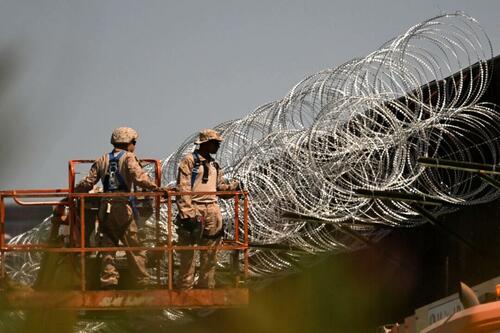
Former Secret Service Chief Remains On Agency Payroll
Authored by Susan Crabtree via RealClearPolitics,
Former Acting Secret Service Director Ron Rowe, who helmed the agency in the tumultuous aftermath of two assassination attempts against President Trump last year, remains on the Secret Service payroll holding the title of senior adviser, according to three sources in the Secret Service community.

News that Rowe has not fully retired and left the agency nearly three months after Trump elevated Sean Curran, his protective detail leader during the campaign, to the director position is fueling concerns about the new leadership’s commitment to truly cleaning house and implementing much-needed agency reforms.
In the wake of the assassination attempts and a frenetic campaign in which the Secret Service was operating with a severe manpower shortage, the agency is hemorrhaging employees and desperately trying to hire and retain agents and officers with recruitment bonuses up to $60,000 paid over four years.
Despite these incentives, hundreds of fed-up agents have applied for lateral moves with the Drug Enforcement Agency, to escape the travel and long workday demands, according to two knowledgeable sources.
A week and a half ago, news of impending DOGE cuts rattled the Secret Service as all employees braced for an email from Homeland Security Secretary Kristi Noem outlining how big the cuts would be and exactly who would be impacted.
Days later, when the Noem email went out, agents and officers were relieved that they wouldn’t be affected by 10% cuts to agency staff. But some worried that any efforts to slash administrative functions would hamper agency functions and further sink morale. Curran has yet to communicate how the DOGE cuts will be implemented, despite Noem’s email saying that news would come directly from individual agency heads.
On Monday, the Secret Service released a new recruiting video featuring several Secret Service agents and officers in action, narrated by Noem and featuring her appearance in its final scenes. In early February the agency spent $2 million on a different recruiting video produced by Hollywood blockbuster director Michael Bay on jumbotron screens at the Super Bowl and on X.com that evening.
Rowe may be staying on the payroll while burning through accrued vacation days and sick leave, but it’s the title of senior adviser that is irritating agents and Uniform Division officers in the Secret Service community. Secret Service agents are questioning whether Rowe is providing advice to Curran and other agency leaders, and whether the agency has established a departure date for Rowe and when that will take place.
Rowe, 51, has 25 years and 10 months of federal service and has been eligible to retire since November, two sources tell RCP. In the Secret Service, unused annual leave has a cash value and is typically taken as a lump sum upon departure or forfeited. Unused sick leave doesn’t have any cash value so people planning to leave usually burn it off before officially retiring, these sources say.
“There is no legitimate reason to keep him on the payroll, and every day he is kept on and allowed to telework as a ‘senior advisor,’ he is accruing more sick leave and annual leave and federal service time towards a bigger pension, which is costing the taxpayers more money,” one source complained.
The Secret Service responded to RealClearPolitics’ Monday inquiry but by Tuesday night had not provided answers to questions about Rowe’s title and continued employment. Efforts to reach Rowe were unsuccessful.
The agency in early February confirmed RCP’s reporting that Rowe would retire after Curran became the director. At the time, Secret Service spokesman Anthony Guglielmi described Rowe as a “valued executive and leader” who is “currently enjoying a well-deserved break before retirement” after 26 years of service.
The Secret Service has a history of allowing senior agents under a public relations cloud or facing disciplinary action to remain on the payroll. In 2015, Alvin Smith, a veteran agent who served as chief of staff to then-Secret Service Director Joseph Clancy, resigned in the wake of several highly publicized security lapses but remained on the payroll for months afterward.
At the time, then-House Oversight Committee Chairman Jason Chaffetz chastised Clancy for misleading Congress about Smith’s departure.
“You have done a very good job of building trust and confidence, and it’s flushed down the toilet when I read and hear about these things,” Chaffetz said.
“Don’t ever come back here to Congress and tell me that you have a financial problem when you’ve got A.T. Smith on your payroll, and you say you don’t have enough money. You shouldn’t have to pay for that out of your budget.”
Meanwhile, Kerry O’Grady, a senior agent who suggested she wouldn’t take a bullet for Trump in 2016, was allowed to remain on the payroll while facing disciplinary action and working from home for more than two years so she could hit retirement and pension goals.
Former Homeland Security Secretary Alejandro Mayorkas tapped Rowe to head the Secret Service after Kimberly Cheatle resigned following the July attempted assassination against Trump in Butler, Pennsylvania, leaving rallygoer Corey Comperatore dead and two other attendees wounded. Rowe’s brief tenure was marked by several testy exchanges with members of Congress who questioned the agency failures before and during the assassination attempts.
In December, Rowe notably got into a shouting match with Rep. Pat Fallon, a Texas Republican, during a hearing of the House Task Force investigating the Secret Service failures.
In late January, when Trump elevated Sean Curran, his protective detail leader during the campaign, to the director position, Curran initiated a house-cleaning, telling 10 senior officials, including Rowe, to resign, retire, or face being reassigned, several Secret Service sources told RCP at the time.
A few days later, Rowe sent out a three-paragraph goodbye email, a tradition for outgoing directors. Rowe notably used the opportunity to sing Curran’s praises without a hint of bitterness over Trump’s decision to replace him. The letter also made no reference to the turbulent and toxic period the agency had just experienced in the months after the assassination attempts.
“Throughout his career, Director Curran has led and played critical roles in both protective operations and the investigative mission,” Rowe wrote. “He has consistently demonstrated outstanding leadership, integrity, and courage. … His vision, dedication, and ability to drive results have earned him respect inside the agency and from law enforcement partners,” he continued.
“I am confident that under his leadership the Secret Service will continue to grow, innovate, and remain steadfast in our unwavering commitment to succeed in our missions.” Rowe’s conclusion that he’s “proud of all that we have accomplished together” without any mention of the monumental failures in Butler and during the second assassination attempt on Trump’s life at a Florida golf course spurred instant ridicule among rank-and-file agents.
But it was the way he signed the letter that gave fellow agents and USSS officers the most pause. Rowe listed his title as deputy director, the post he held before Mayorkas elevated him to the acting director role after Cheatle resigned.
Soon thereafter, Curran named a new deputy director, Darryl Volpicelli, a 24-year Secret Service veteran who has led the presidential protective division and served as the agency’s top liaison to Congress. On the agency website, however, Volpicelli’s position is curiously listed as “acting deputy director” without an explanation for the more temporary-sounding title.
When Rowe listed his title as deputy director in his goodbye email in late January, agents told RCP that any attempt to retain Rowe in a leadership or advisory post would demonstrate a lack of commitment to reforms and lead to continued protection failures, retention problems, and low morale.
“When are we going to seriously fix the problems instead of putting lipstick on a pig?” one source remarked.
Agents and officers hope the recruitment videos and bonuses bring some manpower relief but are also eager for more serious reforms to the agency.
Nine months have passed since the first attempt on Trump’s life and no one has been publicly disciplined for Secret Service failures that led to the assassination attempts. Multiple agency sources allege that agents in the Pittsburgh Field Office, which was partially in charge of devising and executing the security plan for the Butler rally, are set to take the fall for the assassination attempt while two members of the Trump detail, who were under Curran’s leadership at the time, are either not facing the same disciplinary measures or will walk away without being disciplined.
Those disciplinary actions also do not adequately reflect findings from two congressional investigative reports and the bipartisan Independent Review Board that reviewed the failures at Butler and made recommendations to the Secret Service.
The Secret Service’s severe manpower struggles have continued after the campaign and Trump’s inauguration.
In January, Brian Northcutt, head of the Secret Service’s Office of Investigations, sent an email titled, “Field Operations Manpower Update” which thanked the agents for their continued commitment to the heavy lifts over the campaign and for the inauguration but also said there was likely no relief until the late spring or early summer once protective assignments for the outgoing Biden family ease.
“Unfortunately, there will be continued needs for significant numbers of Field Operations personnel to support protective assignments as the transition continues in the coming months,” Northcutt wrote.
Many agents say they are working harder than ever at an unsustainable pace after Rowe promised “a paradigm shift” – that they would not have to continue “doing more with less,” a constant refrain from agency managers in the years leading up to the assassination attempts against Trump.
Even though Trump ended Secret Service protection for President Biden’s children, Hunter and Ashley Biden, and several other members of Biden’s extended family no longer receive agency protection, the demands of the job have only increased in recent weeks. Trump and Vice President J.D. Vance are far more active with more weekend events than Biden and Kamala Harris were for the entire four years of the Biden administration, while Trump’s large family and their travel have posed ongoing manpower challenges.
Susan Crabtree is RealClearPolitics’ national political correspondent.
Tyler Durden
Thu, 04/17/2025 – 17:20















